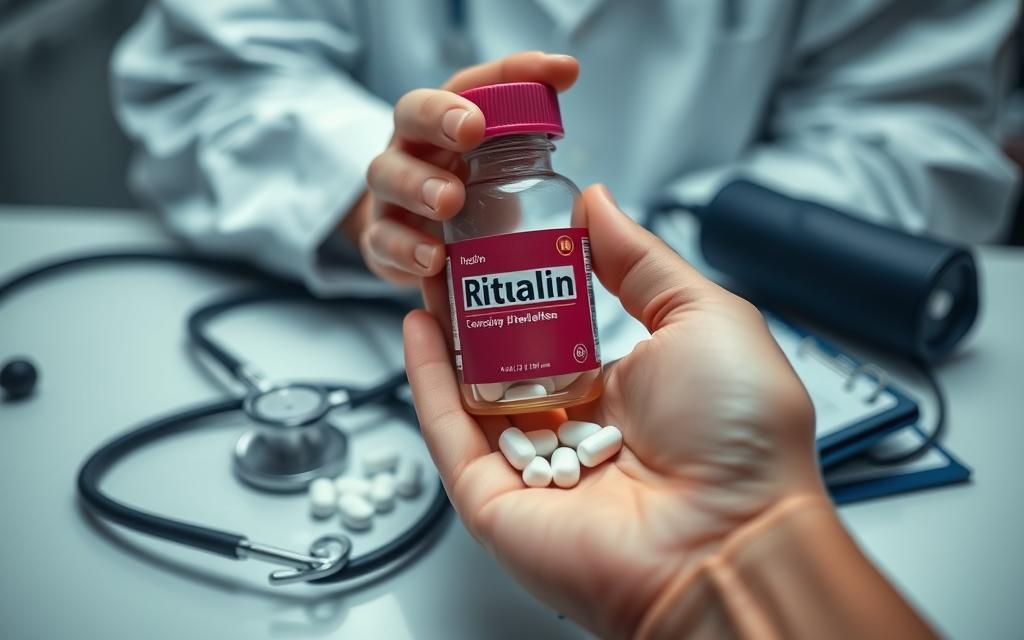Does Ritalin Cause Erectile Dysfunction? Side Effects & Insights
For individuals taking Ritalin to manage Attention Deficit Hyperactivity Disorder (ADHD), concerns about potential side effects on sexual health are common.
The medication, widely prescribed to alleviate ADHD symptoms, has sparked debate regarding its impact on erectile dysfunction. This article aims to explore the relationship between Ritalin and sexual health, providing insights into the potential side effects and what they mean for those affected.
By examining the available data and research, we will shed light on this critical issue, offering a comprehensive understanding of the topic.
Understanding Ritalin: Uses and Mechanism of Action
To understand the potential side effects of Ritalin, it’s crucial to first grasp what Ritalin is and how it works in treating ADHD. Ritalin, known generically as methylphenidate, is a central nervous system stimulant that has been widely used for decades to manage symptoms of Attention Deficit Hyperactivity Disorder (ADHD).
What is Ritalin and How Does it Work?
Ritalin works by altering the levels of certain neurotransmitters in the brain, such as dopamine and norepinephrine, which play key roles in attention and impulse control. By increasing the availability of these neurotransmitters, Ritalin helps improve focus, concentration, and impulse control in individuals with ADHD.
Common Uses and Prescription Guidelines
Ritalin is primarily prescribed for the treatment of ADHD in children and adults. It is also used in the management of narcolepsy, a condition characterized by excessive daytime sleepiness. The dosage and formulation of Ritalin prescribed can vary based on the individual’s condition, age, and response to the medication.
Different Formulations and Dosages
Ritalin is available in various formulations, including immediate-release tablets, sustained-release tablets, and extended-release capsules. The choice of formulation depends on the patient’s needs and the desired duration of action. Dosages are typically started at a low level and adjusted based on efficacy and tolerability.
Understanding the different aspects of Ritalin, including its mechanism of action, common uses, and available formulations, is essential for both healthcare providers and patients to make informed decisions about its use in ADHD treatment.
Erectile Dysfunction: An Overview
Erectile dysfunction is a complex condition characterized by the inability to achieve or maintain an erection sufficient for satisfactory sexual performance.
Defining Erectile Dysfunction
Erectile dysfunction (ED) is a condition that affects a man’s ability to achieve or maintain an erection. It is a common condition that can be caused by a variety of factors, including physical health issues, psychological factors, and lifestyle choices.
Common Causes and Risk Factors
The causes of erectile dysfunction can be diverse, ranging from cardiovascular disease and diabetes to stress and anxiety. Other risk factors include smoking, excessive alcohol consumption, and certain medications.
- Cardiovascular disease
- Diabetes
- Obesity and lack of physical activity
- Psychological factors such as stress and depression
Impact on Quality of Life
Erectile dysfunction can have a significant impact on a man’s quality of life, affecting not just his sexual health but also his mental and emotional well-being. It can lead to feelings of inadequacy, low self-esteem, and strain on relationships.
Does Ritalin Cause Erectile Dysfunction?
The use of Ritalin for managing ADHD symptoms has raised concerns about its impact on sexual health. Ritalin, a central nervous system stimulant, is widely prescribed for Attention Deficit Hyperactivity Disorder (ADHD). While effective in managing symptoms of ADHD, there have been reports of sexual side effects, including erectile dysfunction (ED).
Research and Clinical Evidence
Several studies have investigated the link between Ritalin and erectile dysfunction. Clinical evidence suggests that Ritalin may contribute to ED in some individuals, although the exact mechanism is not fully understood. Research indicates that the prevalence of sexual side effects, including ED, varies among individuals taking Ritalin.
A study published in the Journal of Clinical Psychopharmacology found that sexual dysfunction, including ED, was reported by a significant percentage of participants taking Ritalin. However, it’s crucial to note that these studies often have limitations, such as small sample sizes or reliance on self-reported data.
Mechanism Behind Potential Sexual Side Effects
The potential mechanism behind Ritalin-induced ED is complex and multifactorial. Ritalin affects neurotransmitter levels in the brain, including dopamine and norepinephrine, which play roles in sexual function. Alterations in these neurotransmitters could potentially contribute to sexual side effects.
- Increased dopamine levels may initially enhance sexual desire but could lead to long-term changes in sexual function.
- Altered norepinephrine levels can affect blood flow and potentially contribute to erectile dysfunction.
Prevalence Rates Among Ritalin Users
Prevalence rates of erectile dysfunction among Ritalin users vary widely across studies. Some research suggests that up to 20% of individuals taking Ritalin may experience sexual side effects, including ED. However, these figures can be influenced by factors such as dosage, duration of treatment, and individual susceptibility.
- Studies indicate that higher doses of Ritalin may be associated with a greater risk of sexual side effects.
- The duration of Ritalin treatment can also impact the likelihood of experiencing ED.
Understanding the relationship between Ritalin and erectile dysfunction is crucial for managing ADHD effectively while minimizing potential sexual side effects. Healthcare providers should consider these factors when prescribing Ritalin and monitor patients for any signs of sexual dysfunction.
Other Sexual Side Effects Associated with Ritalin
Beyond erectile dysfunction, Ritalin users may experience a range of other sexual side effects that can impact their quality of life. These effects can be distressing and affect not only the individual but also their relationships.
Decreased Libido and Sexual Desire
One of the common sexual side effects reported by Ritalin users is a decrease in libido or sexual desire. This can be attributed to the medication’s influence on neurotransmitters in the brain, such as dopamine and serotonin, which play crucial roles in regulating sexual function.
Ejaculation Problems and Delayed Orgasm
Ritalin can also cause issues related to ejaculation, including delayed orgasm or, in some cases, an inability to ejaculate. These problems can be particularly challenging for individuals, affecting their sexual satisfaction and overall well-being.
Priapism and Other Rare Sexual Side Effects
In rare instances, Ritalin has been associated with priapism, a condition characterized by a prolonged erection that is not related to sexual arousal or does not resolve after sexual activity. Although rare, priapism is a serious condition that requires immediate medical attention to prevent long-term damage.
The following table summarizes the sexual side effects associated with Ritalin:
| Sexual Side Effect | Description | Prevalence |
|---|---|---|
| Decreased Libido | Reduced sexual desire or interest | Common |
| Ejaculation Problems | Difficulty or inability to ejaculate | Common |
| Priapism | Prolonged erection not related to sexual arousal | Rare |
Common Non-Sexual Side Effects of Ritalin
Understanding the full spectrum of Ritalin’s side effects, beyond sexual health, is vital for patients and healthcare providers. While Ritalin is a valuable medication for managing ADHD, its use can be associated with a variety of non-sexual side effects.
Physical Side Effects
Ritalin can cause several physical side effects. Common issues include:
- Changes in appetite and sleep patterns
- Increased heart rate and blood pressure
- Headaches and dizziness
These physical effects can vary in severity and impact daily functioning. Monitoring and managing these side effects is crucial for maintaining overall health.
Psychological and Emotional Side Effects
Ritalin can also have psychological and emotional side effects, including:
- Mood swings and irritability
- Anxiety and feelings of restlessness
- In some cases, it may contribute to depression or emotional dysregulation
Being aware of these potential effects can help patients and caregivers take proactive steps to manage them.
Long-term Side Effect Concerns
Long-term use of Ritalin raises several concerns, including the potential for dependence and the impact on growth and development in children. Regular check-ups with healthcare providers are essential to mitigate these risks.
| Side Effect Category | Common Issues | Management Strategies |
|---|---|---|
| Physical | Appetite changes, sleep disturbances, increased heart rate | Monitoring, lifestyle adjustments |
| Psychological/Emotional | Mood swings, anxiety, depression | Counseling, medication adjustments |
| Long-term Concerns | Dependence, growth impacts in children | Regular healthcare check-ups, dosage management |
Risk Factors: Who’s More Likely to Experience Sexual Side Effects?
Understanding the risk factors associated with Ritalin can help individuals better navigate potential sexual side effects. While Ritalin is effective for managing ADHD symptoms, its impact on sexual health can vary significantly from person to person.
Age and Pre-existing Conditions
Age is a significant factor when considering the risk of sexual side effects from Ritalin. Older adults may be more susceptible due to decreased physiological reserve and the presence of comorbid conditions. Pre-existing health conditions, such as hypertension, diabetes, or cardiovascular disease, can also increase the risk of experiencing sexual side effects.
Individuals with a history of sexual dysfunction or mental health conditions like depression and anxiety may also be more likely to experience sexual side effects while taking Ritalin.
Dosage and Duration of Treatment
The dosage and duration of Ritalin treatment can significantly impact the likelihood of sexual side effects. Higher doses are often associated with a greater risk of sexual dysfunction. Similarly, long-term use of Ritalin may lead to increased risk over time.
- Higher doses of Ritalin may increase the risk of sexual side effects.
- Long-term treatment may lead to adaptation or increased sensitivity to the medication.
Concurrent Medications and Interactions
Ritalin can interact with other medications, potentially increasing the risk of sexual side effects. Concurrent use of antidepressants, antipsychotics, or blood pressure medications can complicate the treatment regimen and increase the risk of adverse effects.

It’s essential for individuals taking Ritalin to discuss their medication regimen with their healthcare provider to minimize potential interactions and side effects.
Managing Erectile Dysfunction While Taking Ritalin
Managing erectile dysfunction while on Ritalin involves understanding the causes and implementing effective solutions. Erectile dysfunction (ED) can be a distressing side effect for some individuals taking Ritalin for Attention Deficit Hyperactivity Disorder (ADHD). Fortunately, there are several strategies that can help mitigate this condition.
Medication Adjustments and Timing Strategies
One approach to managing ED while taking Ritalin is to adjust the medication regimen. This might involve altering the dosage or switching to a different formulation. For instance, some individuals may find that taking Ritalin at a specific time of day helps minimize its impact on sexual function. Consulting with a healthcare provider is crucial to determine the best adjustment strategy.
Lifestyle Modifications That May Help
In addition to medication adjustments, certain lifestyle changes can help alleviate ED. These include regular exercise, a balanced diet, stress management, and avoiding excessive alcohol consumption. Exercise has been shown to improve erectile function by enhancing blood flow and overall cardiovascular health.
Potential Treatments for Medication-Induced ED
For some individuals, additional treatments may be necessary to manage ED caused by Ritalin. These can include oral medications like sildenafil, counseling, or other interventions aimed at addressing the underlying causes of ED. It’s essential to discuss these options with a healthcare provider to find the most suitable treatment plan.
By exploring these strategies, individuals taking Ritalin can better manage erectile dysfunction and improve their overall quality of life.
Balancing ADHD Treatment and Sexual Health
For many, managing ADHD symptoms with Ritalin while maintaining sexual health can be a challenging juggling act. The key is finding a balance that works for each individual.
Weighing Benefits Against Side Effects
When considering ADHD treatment options, it’s essential to weigh the benefits of Ritalin against its potential side effects. While Ritalin is effective for many in managing ADHD symptoms, its impact on sexual health can be a significant concern.
A detailed analysis of the benefits and risks can help patients and healthcare providers make informed decisions. The table below summarizes key points to consider:
| Aspect | Benefits | Potential Side Effects |
|---|---|---|
| ADHD Symptoms Management | Effective in reducing ADHD symptoms | Potential for sexual side effects |
| Sexual Health | Improved mental health can enhance sexual well-being | Risk of erectile dysfunction and decreased libido |
Patient Experiences and Perspectives
Understanding patient experiences can provide valuable insights into the real-world effects of Ritalin on sexual health. Many patients report a significant impact on their sexual well-being, while others experience minimal effects.
Sharing experiences and discussing concerns with healthcare providers can help tailor treatment plans to individual needs.
Communication Strategies with Partners
Open communication with partners is crucial for maintaining healthy relationships while navigating the challenges of ADHD treatment and sexual health. Discussing concerns and experiences can foster understanding and support.
Strategies for effective communication include:
- Being open about the effects of Ritalin on sexual health
- Discussing ways to manage sexual side effects together
- Seeking professional advice together when needed
By balancing ADHD treatment with considerations for sexual health, individuals can work towards a healthier, more balanced life.
Alternative ADHD Medications with Fewer Sexual Side Effects
Exploring alternative ADHD medications can be a vital step for individuals dealing with Ritalin’s sexual side effects. For those seeking different options, there are several alternatives available.
Non-Stimulant Options
Non-stimulant medications are often considered for patients who experience significant side effects from stimulant medications. Atomoxetine (Strattera) and guanfacine (Intuniv) are examples of non-stimulant ADHD medications that may have fewer sexual side effects.
Atomoxetine works by selectively inhibiting the reuptake of norepinephrine, and it is not commonly associated with sexual side effects. However, it’s essential to discuss potential side effects with a healthcare provider.
Other Stimulant Medications
For some patients, switching to a different stimulant medication may alleviate sexual side effects. Amphetamine-based medications, such as Adderall, are commonly prescribed alternatives. However, the risk of sexual side effects can vary among different stimulants.

Complementary and Supportive Therapies
In addition to medication, complementary therapies can play a crucial role in managing ADHD symptoms. Cognitive-behavioral therapy (CBT) and lifestyle modifications, such as regular exercise and a balanced diet, can be beneficial.
These therapies not only help in managing ADHD but can also contribute to overall well-being and potentially mitigate some sexual side effects associated with medication.
Conclusion
Understanding the relationship between Ritalin and erectile dysfunction is crucial for individuals managing ADHD. While Ritalin is effective in treating ADHD symptoms, its potential impact on sexual health cannot be overlooked.
The complex interplay between Ritalin and erectile dysfunction highlights the need for personalized treatment approaches. Factors such as dosage, duration of treatment, and individual health conditions play a significant role in determining the risk of sexual side effects.
By weighing the benefits of Ritalin against potential side effects and exploring alternative ADHD medications, individuals can make informed decisions about their treatment. Consulting healthcare professionals is essential to address specific concerns and develop strategies to manage erectile dysfunction while undergoing ADHD treatment.
Ultimately, a comprehensive understanding of Ritalin’s effects and open communication with healthcare providers can help individuals navigate the challenges of ADHD treatment and maintain overall well-being.
